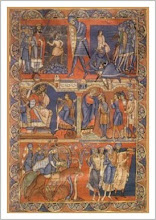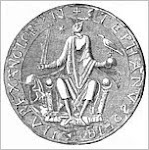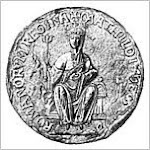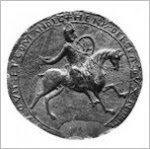• 1139: Matilda Comes to Claim her Throne
Matilda and Geoffrey had not been idle in Anjou after the death of Henry I and documentation shows they were active in gathering support for their cause. Once Anjou was secure Geoffrey turned his attention to Normandy in 1138 and fought staunchly there for his wife and son's inheritance. He finally secured the duchy in 1144, assuming the title Duke of Normandy until he and Matilda ceded it to their son, Henry, in 1149. Conversely, Stephen only visited Normandy once in his reign, in 1137, and it was at this time that his son Eustace paid homage to the French King Louis for Normandy.
Meanwhile, although Robert of Gloucester had attended Stephen's Easter Court in 1136 he eventually grew disappointed and withdrew. Perhaps he was alarmed at the favour being bestowed on the Flemish mercenary, William of Ypres, and at the rising power of the Beaumont brothers, Waleran, 1st Earl of Worcester, and Robert, 2nd Earl of Leicester, and no doubt he had also witnessed some of the leniency Stephen had shown to his unruly barons. In 1138 Robert raised the flag of rebellion against Stephen and declared for his half sister Matilda. Brian Fitzcount, who was a staunch supporter of her claim, promptly followed suit in 1139 as did Miles of Gloucester, who as Sheriff put Gloucester at her disposal. Reginald of Cornwall, another illegitimate son of Henry I, could have possibly declared for her as well at this time.
The year 1139 would prove to be disastrous for Stephen. He raised the enmity and resentment of his brother Henry when Theobald of Bec was appointed Archbishop of Canterbury. Henry suspected the influence of Waleran was at work in this decision because Waleran was a lay patron of Bec. In an attempt to pacify Henry he was appointed Papal Legate. Furthermore, Stephen, who had grown irritated by the overwhelming influence of Roger of Salisbury and his nephews, found a pretext for demanding the surrender of Roger's and the Bishops of Ely and Lincoln castles. When they refused to surrender them Stephen had them arrested and after a short struggle all Roger's wealth and possessions were seized. Stephen's attack on Roger incensed the clergy, including his brother Henry the Bishop of Winchester, who perceived it as an attack on the church itself. When Stephen was summoned to a church council to answer for the seizure of castles held by Roger it was Aubrey de Vere who represented the King. The appalling treatment of Roger proved to be a poor decision that would come to cost Stephen dearly.
Having created an immense amount of ill feeling and resentment among his clergy and barons, Stephen now faced the arrival of Matilda who landed in England in September 1139 and sought refuge with Adelica, the former queen of her father Henry, at Arundel Castle. (Her second husband William d'Aubigny, 1st Earl of Arundel, although a supporter of Stephen, would in time became instrumental in arguing for a peace settlement between Stephen and Henry of Anjou). Amazingly, Stephen allowed Matilda to go free and travel onto Bristol under escort and join forces with her brother, Robert of Gloucester. Perhaps such chivalrous gestures were important to Stephen - surely it couldn't be another example of his poor judgement skills due to his reportedly easygoing nature! - but whatever his reasoning, the upshot of this decision meant that there were now two rival courts in England - Stephen primarily in the south east and Robert/Matilda in the south west.
Robert promptly commenced a campaign to dispossess landholders within his area who were loyal to Stephen. He also commanded raids against possessions of the Beaumont brothers including Wareham in Dorset and Worcester, taking Robert of Leicester's lands in Dorset for himself. Although Robert was now secure in his heartlands he did not find it an easy task to recruit wider support and Stephen succeeded in containing him in the West Country and Severn valley. It was a stalemate of sorts and in August 1140 both sides sent representatives to an unsuccessful peace conference held at Bath.
Robert's next opportunity came late in the year 1140 when Ranulf, Earl of Chester seized Lincoln castle in a scene reminiscent of Baldwin de Redvers several years before. Ranulf allied himself with Robert, his father in law, and pledged fealty to Matilda in exchange for Robert's agreement to provide a force to help defeat Stephen's army which had laid siege to Lincoln. They united their forces, which included a host of Welsh mercenaries allied to Robert, at Donington castle in January 1141. On 2nd February 1141 the Earl's army met King Stephen's at the Battle of Lincoln.
• The Anglo-Saxon Chronicle: The Years 1102-1154
• From the chronicle of Orderic Vitalis: Countess Matilda and Robert, Earl of Gloucester, land at Arundel
"In the autumn, Matilda, countess of Anjou, crossed the sea to England, with her brother Robert of Caen, Guy de Sable, and several others; and being well received at Arundel, she obtained leave from the king to pass without interruption to the castles which belonged to her partisans. It may be remarked that this permission given by the king was a sign of great simplicity or carelessness, and prudent men regret that he was regardless of his own welfare and the kingdom's security. It was in his power at this time to have easily stifled a flame which threatened great mischief, if, with a policy becoming the wise, he had at once driven away the wolf from the entrance of the fold, and, for the safety of the flock, nipped the growth of malignancy in the bud, and, like his fathers, crushed the deadly efforts of those whose enterprise threatened the country with pillage, slaughter, and depopulation, by smiting them with the sword of justice."
Notes:
Aubrey de Vere seems to be one baron who was loyal to the institution of the monarchy and to the administration of state in England rather than to a particular figure or 'side'. He was appointed Lord Great Chamberlain by Henry I in 1133 and served both him and Stephen as well as being appointed Sheriff of several Shires. Aubrey died in 1141 and eventually his son would be created 1st Earl of Oxford.
07 August 2010
Subscribe to:
Post Comments (Atom)








No comments:
Post a Comment